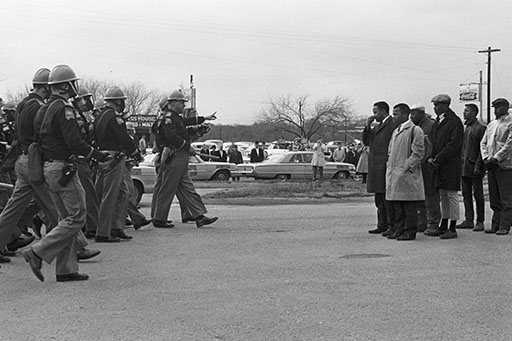7 The Voting Rights Act
Perhaps most significantly, the Civil Rights Act did not do enough to address the problem of Black disenfranchisement in the South. Although Black people had not been entirely barred from registering to vote, many states in the South made the process of registering to vote intentionally convoluted and complex for Black people in order to prevent them from doing so. The Civil Rights Act ensured that these discriminatory practices were outlawed, but it did not eliminate literacy tests, which were still often used to determine whether a person was eligible to vote. This disproportionately disenfranchised poorer Black Americans, who had often not had the same educational opportunities as their White counterparts.
Voter registration therefore became a key focal point for many civil rights activists throughout 1964 and 1965. In the summer of 1964, SNCC organised what became known as ‘Freedom Summer’, during which young activists, Black and White, travelled from northern universities to Mississippi in order to assist voter registration in Black communities. The following March, civil rights activists, including prominent members of the SCLC and SNCC, organised a series of marches in Alabama from Selma to Montgomery. Once more, brutally repressive policing captured worldwide media attention, forcing President Lyndon Johnson to act. For the third march, the president arranged for the National Guard to escort the protestors, protecting them from local police and violent mobs.

The protests were successful in achieving their immediate goal. Johnson called on Congress to introduce a Voting Rights Act, which he signed into law in August 1965. The Act eliminated literacy tests and permitted federal examiners to police the voter registration process. The Act quickly helped to address the problem of disenfranchisement: in Alabama and Mississippi, for example, fewer than 10 percent of Black people of voting age were registered to vote at the beginning of the 1960s; by 1968 this had risen to 60 percent (Reynolds, 2009, pp. 419–421).
Activity 4
Reflecting on what you have read above, why do you think the issue of voting rights was so important for civil rights activists? And in what ways might the Voting Rights Act have helped to advance the interests of Black Americans?
Discussion
Black enfranchisement had the potential to advance the interests and concerns of Black people in ways that were impossible before. There was now a greater need for politicians to consider the views and concerns of Black people, while Black voters had the opportunity to vote for politicians, including Black politicians, who might represent their interests at both a state and federal level.
